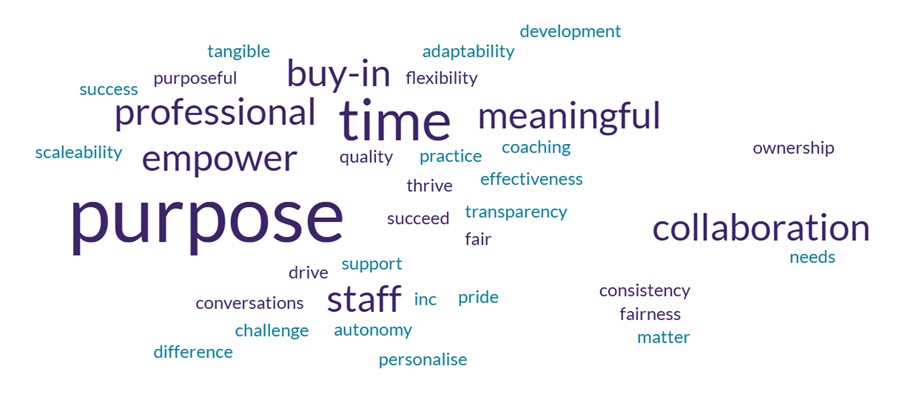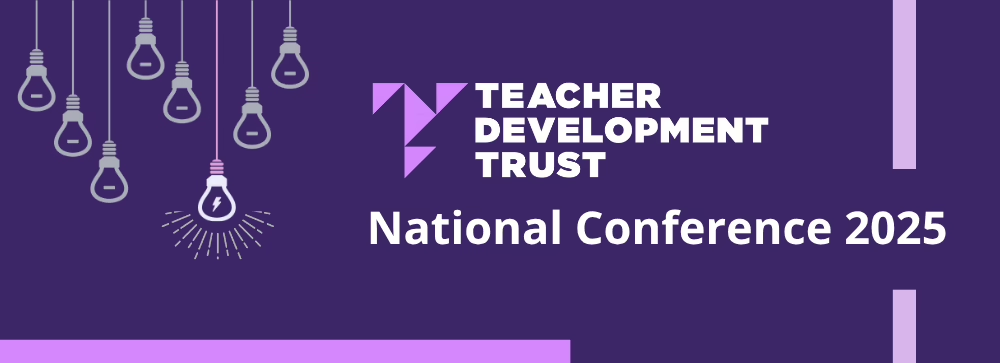Last week, TDT hosted a forum with school leaders, delving into the real-world challenges of appraisal following the removal of Performance Related Pay (PRP). Building on TDT’s recent report and recommendations, our goal was to hold a space for leaders to discuss with one another the practical issues they are grappling with as the appraisal landscape shifts.
The forum opened with leaders sharing key words they associate with effective appraisal.

A powerful consensus emerged around terms like purpose, time, buy-in, empower, collaboration and professional. This immediate word association highlighted a clear desire for appraisal to be a meaningful, impactful process, rather than a bureaucratic hurdle.
It was interesting to note that approximately two thirds of those leaders in attendance were just beginning to review their appraisal system so these discussions are incredibly timely in aiming to support them in this process. Leaders were given opportunities to further discuss their individual contexts and circumstances when it comes to making changes to appraisal.
Drawing together the conversations across the different breakout rooms with leaders of varying contexts, there were some clear parallels in the challenges they are all facing, all of which highlighted that navigating changes to appraisal is a complex task that cannot be done in isolation.
1. Purpose and Focus
A recurring theme was the fundamental question – ‘What are we trying to achieve with appraisal?’ Leaders stressed that for appraisal to be truly purposeful and integrated into the wider school systems, it needs to link directly to whole-school needs while at the same time enable staff autonomy. The aim for all leaders is to engage in quality appraisal conversations that genuinely drive improvement and make a tangible difference to practice and outcomes
2. Workload and Paperwork
The paperwork associated with appraisal was a significant discussion point, viewed as often onerous and not as serving purpose. There was a strong sentiment that ‘the value is in the room,’ rather than in the associated paperwork which often serves the agenda of prove rather than Improve. Discussions then explored how technology, specifically AI tools, might potentially help record discussions and reduce workload burden. However, this also sparked ethical considerations around sensitive information and whether AI might change the nature of the conversation. Regardless, it was clear that there is still a reluctance to let go of current recording systems due to the pressure leaders feel to keep evidence for clarity of expectations and agreed outcomes.
3. Accountability and Performance
Leaders acknowledged the challenge of addressing those who may not be committed to self development. While the focus is on supporting and empowering effective teachers, there are still HR concerns around tackling poor performance, where traditional processes and paperwork have historically been relied upon. There was a call for support to unpick the two parallel systems and how these might practically be applied within school settings. The need to avoid designing a system primarily focused on ‘struggling’ staff was highlighted, advocating for a system that nurtures professional pride and development for everyone.
[What would I] ‘be able to use to support when they had to tackle poor performance?’
4. Leadership Capability
The abilities of appraisers themselves were a key point of conversation. While good training is vital, the appraiser’s seniority also matters, as a headteacher or deputy headteacher can bring a broader perspective and more easily facilitate CPD opportunities. This becomes challenging in larger settings where middle leaders often conduct appraisals but potentially lack the skills and the power to make CPD decisions. The importance of CPD for everyone involved in the process, including appraisers, was stressed which in itself required resources and a carefully considered approach.
5. Integration and Context
Appraisal needs to be seamlessly integrated with professional development and whole-school improvement initiatives. Leaders emphasised that school contexts are all highly unique and as a result require systems that support individual environments.
6. Short vs. Long-Term Targets
Interestingly, discussions revealed a difference in thinking around appraisal timeframes. Some leaders are exploring much shorter time frames (half termly/termly targets) focusing on very specific professional or wellbeing goals. Conversely, others are considering longer term targets (e.g. a year long project) to allow teachers more time for research and in-depth implementation.
7. Resources and Investment
Not surprisingly, budgetary concerns remain a significant challenge. While schools want to provide high-quality CPD, financial constraints often force difficult prioritisation decisions. There was a call for some form of accreditation for CPD providers to support leaders in their decision making around CPD, ensure quality and avoid gimmicks. The idea of curated platforms for professional conversations, potentially influenced by social media, was also suggested to bridge gaps in sector needs.
‘It is not a lack of wanting to provide high quality CPD but it is about not having the actual money to do it and where do you ultimately prioritise?
8. Culture
Underpinning all these challenges is school culture. Achieving staff buy-in, shifting mindsets, and overcoming resistance to change are crucial. There’s a strong desire to link appraisal to a coaching culture, fostering an environment where teachers feel empowered and collectively accountable. The journey towards embedding such a culture can be a long one, with one international example shared taking four years and still ongoing.
Moving Forward: Shaping Meaningful Appraisal
The forum highlighted that while the removal of PRP offers new freedoms, it also presents complex challenges for school leaders that require thoughtful solutions and a need to consider a wider set of factors to ensure it meets the needs of all involved most effectively. The insights gathered from this forum will directly inform TDT’s ongoing work to support school leaders in developing appraisal systems that are truly purposeful, reduce unnecessary burdens, foster professional growth, and ultimately make a tangible difference to teaching practice and pupil outcomes.
If you are a school leader we would love to hear from you! Please tell us how we can best support you in navigating appraisal in your setting by completing our short form.
Also, if you feel your school has an appraisal journey that may help others then please do share this with us. You can get in touch by using our Get in Touch form.




